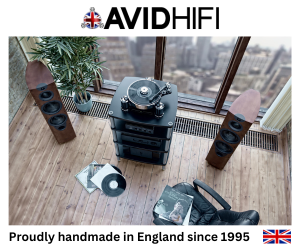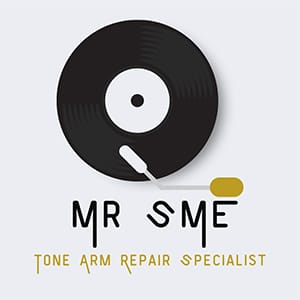There was a time when the direct drive approach was frowned upon by the traditional hifi fraternity, who saw it as little more than mass market DJ fodder. But as anyone who’s pimped an SL-1200 will tell you, once you get past the stereotypes, there’s a lot to be said for a DC powered motor pushing your platter directly, especially in the bass control regions.
So when a few years back the New Jersey team at VPI, spearheaded by head honcho Mat Weisfeld and his company founding father Harry, announced their own direct drive approach to a hi-end deck (the HW-40), it raised more than a few curious eyebrows at the prospect of all that VPI knowhow married to cutting edge electronics.

From a different vinyl dimension, the Avenger Direct looks out of this world
We are family
For those less familiar with this brand here’s a quick plotted history – VPI is a family business that goes back decades, building turntables that look deceptively simple to set up and use while also being built like tanks and just as reliable. And for these reasons they’re an ideal reviewer’s tool (talking from personal experience, as I’ve owned more than one) because they’re a perfect blend of quality and real world usability.
The Avenger line is VPI’s hi-end range, sitting above its Scout and Prime models and below the flagship Titan and Vanquish statement machines. It starts with the standard Avenger at £13,750 with the Plus and Reference models priced above with upgrades along the way, topping out with the Avenger Direct at £36,500, putting it firmly in turntable grail territory.

Masters of the groovyverse – Mat and Harry Weisfeld know more than a thing or two about serious vinyl replay
All Avenger models are built using a curved triple layered chassis formed from a sandwich of bonded black acrylic and aluminium, with damping material between each layer, locked together by three large isolation steel outrigger posts. These then sit on a foot assembly, made up of large threaded aluminium cones and Delrin cups, bringing more isolation and grip, with levelling on the fly.

Each foot consists of a large threaded cone, aluminium outer foot and Delrin inner with a rubber sleeve inside to grip the cone. The orange bands are large soft ‘o’ rings that provide plenty of grip while absorbing vibration
Go direct
Being a direct drive model allows the Avenger Direct to be relatively compact (measuring 48cm wide at its extremes without the tonearm) compared to the range’s other models, and this is because there’s no external motor and belt to accommodate. Instead its stator is housed within a central chassis in a solid T6061 aluminium billet that’s milled out.
Its rotor is then press fitted into a solid alloy sub platter, upon which the main platter rests that also hosts the centering pin. What’s really impressive here is how VPI has made the basic Avenger chassis so versatile from the outset, so that it can take a completely different and more complex drive system without major external changes, resulting in an end product that looks sleeker and simpler than the models under it.
And why go direct? In short it’s all about control. As by removing a standalone motor and belt you also remove potential fluctuations in platter speed, as the belt stretches and contracts in use. Instead VPI can engineer the Avenger Direct’s encoder with more precise levels of speed accuracy by tracking 2,500 counts per single revolution of positional feedback that’s then fed to an internal servo, to ensure its rotational speed remains bang on at 33.3 or 45rpm (electronically selected from its front panel).

Armboard and main platter removed reveals the alloy sub-platter with centering stud that locates into a precision recess in the main platter. Three front panel buttons are standby and speed selection
The fat of the wand
The considered approach to usability continues to the deck’s tonearm mounting, which is done via a supplied 5/8” thick 6061 aluminium armboard that clamps around the rear support pillar. And as each of the deck’s three support pillars have identical diameters, should you wish you can buy more armboards and run up to three tonearms concurrently.
The supplied tonearm is another landmark VPI design in the guise of its 3D printed 12″ gimball bearing Fatboy model, which comes as standard on the deck. With an effective mass of around 12.5g, it’s at the lower end of the moderate range, making it a match for all but the least compliant cartridges.

Armboard mounts via an allen headed clamp. 12″ Fatboy tonearm (minus counter-weight) ready to be sited on the brass raiser collar and mounting pin. A supplied jig helps you get the arm and cartridge in optimal position
The accessory pack is also cherrypicked from VPI’s reference stable, with a heavyweight record clamp and periphery ring, whereby the latter is designed to be placed over the circumference of a record to flatten out any warps – another simple yet highly affective VPI approach to making sure you’re hearing your vinyl at its best.

Arm counterweight, record clamp and periphery ring all come in matching polished livery, with inset rubber rings to aid grip while absorbing vibration
You may think that setting up a £36.5k turntable is a daunting experience laden with nerve-wracking fine-tuning and hours of adjustment, because of the added complexities sophistication can bring. But thankfully the Avenger Direct is typical VPI, and anyone who’s unboxed one of the brand’s cheaper decks will find this model just as straightforward to get up and spinning.
On a level surface mount the feet assemblies by passing a rubber washer over a short threaded rod that hangs down from each outrigger and spin each large alloy cone into place. Next add the Delrin and alloy cups, with their orange rubber rings facing down and wind the cones up/down to get it bang on level.
Now you need to add the 11kg alloy platter, taking care to lower it evenly over the sub-platter so that it seats properly.

The main platter is a snug fit, and thankfully VPI supplies a threaded tool to help you lift and lower it into place
Now its time to clamp the armboard into position and add the armwand and riser, which threads into a large brass bushing under the riser dial. Armheight can be initially set based on how far up you clamp the armboard on the outrigger, and then using the large threaded dial for fine-tuning. As we’ve seen before with VPI, the RCA sockets are top quality and generously spaced, allowing for interconnects of your choosing.

Fatboy tonearm with its gimball bearing and looping armwires, terminated in a LEMO connector. Anti-skate is generated by the arm-wires’ twists, and there’s also a hanging weight below the riser dial, attached to a nylon thread
All that’s left to do is align your chosen pick-up using the supplied jig, fine-tune the arm height and set the tracking force using the snug-fitting counterweight.
Performance
For testing purposes, cartridges were selected from a range of established brands including Benz and Goldring with the latter’s class-leading Ethos moving-coil. While on phono stage duty is my reference Primare R35, feeding a Rotel Michi X5 amplifier and ATC SCM100PSL loudspeakers.
With periphery ring and heavy duty clamp in place on its massive platter, it’s remarkable how quickly this deck gets up to speed while turning all that weight – thanks to plenty of torque. Spinning Future Islands’ latest LP People Who Aren’t There Anymore lets you know just how capable this deck is. Right from the opening track King Of Sweden, there’s a sense of timing that’s iron grip like. And this album, with its pacy electronic beats and shifts in tempo, really revels in it. To compare it to a top flight digital front end is an easy line to draw, given how precise the VPI’s delivery sounds, but what also comes through in abundance is how it gets to the soul of each performance. And it does this because of how deep the VPI package can dig into the black stuff (although in this case, it’s a fashionably transparent ‘indie exclusive’ vinyl pressing, designed to impress your hifi mates and audio hipsters in equal measures).
You could presume what I’m also hearing and crediting here is the cartridge, which clearly plays its part, and for parity hearing the same pick-ups on my VPI Scout 21 reference machine reveals similar traits but on a lesser scale by some way. Comparing the Goldring cartridge for example across both decks with the Deep In The Night track from the same album, has a depth and scale to it that’s grander in every direction and dimension via the Avenger. Those low bass notes sound so much denser, richer and thickly articulated to really give the ATCs’ 12″ bass drivers a thorough workout.
And what this also reveals is how much this machine can get out of even modestly priced cartridges. Sure, £1k for a pick-up isn’t a budget buy by any stretch, but on a £36.5k deck it’s also being asked to punch well outside of its usual comfort zone, and the VPI is more forgiving than most superdecks by playing to its strengths, rather than overly exposing its weaknesses.

Goldring’s flagship Ethos MC pick-up is in more than capable hands on the VPI
Another clear characteristic of the Avenger Direct is its ability for extracting detail, without sounding overly analytical.
My Island Life re-issue of Bob Marley & The Wailers’ Exodus isn’t a patch on my original pressing, yet hearing it aboard the VPI rig shows how balanced this deck really is. Bass notes are superbly articulated and well rounded – with a textured realism that some hi-end decks could only dream of, and the wider mix is just as impressive. Hear Marley’s vocals on Guiltiness for example and try not to sit up and take notice of how his voice is held at an ideal distance within the soundstage – not too forward but nor is it suppressed too deeply in the mix.
Larking around
There’s also a vast openness that’s afforded to all the music that graces the VPI’s platter, which you only really get with the most accomplished 12″ tonearms. This is brought to full effect in how the lead guitar zips across the soundstage on The Heathen and the instrument separation on the Marley album’s title track for example. And what this all combines into is vinyl replay at its best, to the point where the turntable audibly disappears, to allow all the detail in those tiny vinyl grooves to be delivered with an analogue purity that few can match.

Avenger Direct awaiting its next pick-up, note the main power connector and on/off switch on its lower rear chassis
While I could dance to the beats of this deck until the sun comes up, it’s also equally accomplished across a range of musical genres, and playing a 1967 performance of Vaughan Williams’ The Lark Ascending by the London Philharmonic Orchestra is an experience to savour. Hearing those background strings emerge from deep in the soundstage as the lead violin soars across the wider accompaniment sounds utterly beguiling. While there are many hi-end machines that will draw you into this track without hesitation, few sound as majestic as the VPI, it just does everything right.
In Summary
Unlike most hi-end turntable manufacturers striving for the stars with ever more complicated ways to create uncompromised vinyl magic, with the Avenger Direct VPI has pulled an uncanny trick, by building a no-compromise ultra-spinner that’s also a breeze to live with day to day. Few turntables in this league are so simple to use, and yet so rewarding to hear, which is testament to what a great design this is.
The Avenger line is of course already well established as reference products that will last a lifetime, and with the Direct model this takes the concept to the next level for ease of use and a thoroughly accomplished musical delivery. This is vinyl replay at its finest.













